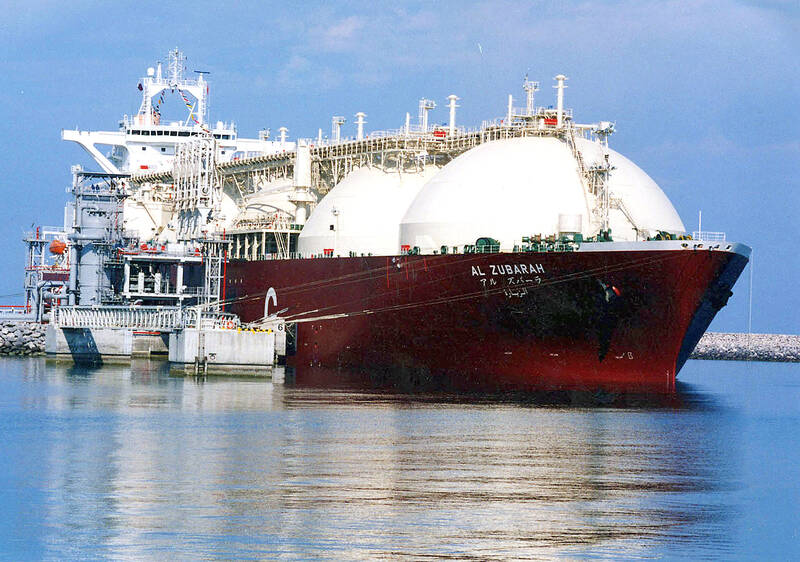A US-based think tank has urged Taiwan to address vulnerabilities in its energy sector, warning that Qatar, a major liquefied natural gas (LNG) supplier to Taiwan, could be susceptible to Chinese pressure to halt gas shipments.
The Foundation for Defense of Democracies made the recommendation following a two-day tabletop exercise in July simulating Chinese attacks on Taiwan’s energy sector, which was conducted with experts from Taiwan, Japan, Australia and the UK.
The exercise explored a cyber-enabled economic warfare (CEEW) campaign by China to disrupt or block Taiwan’s LNG and coal imports, using diplomatic, economic and intelligence tools backed by military pressure.

Photo: AP
In a report published on Sunday, the foundation said that about half of Taiwan’s electricity is generated using LNG, and that all of the nation’s LNG and coal are imported. Combined with limited storage capacity, this poses strategic risks.
“The CCP’s [Chinese Communist Party’s] heavy use of CEEW, selective maritime quarantines and diplomatic pressure on Taiwan’s energy providers would allow China to easily put Taiwan in extremis, undermining societal resilience and compromising continuity of the economy,” it said.
Disruption of the nation’s LNG supply would force Taiwan to choose between prioritizing electricity for households and hospitals or its semiconductor industry, which is key not only to its economy, but its leverage in global diplomacy, it said.
The report urged Taiwan to rethink its dependence on Qatar for 30 percent of its LNG imports, as Doha is “susceptible to Chinese pressure.”
Instead, Taiwan should lock in US energy contracts “even at a cost premium”; build more capacity for LNG storage; develop more renewable capacity, and possibly restarting shuttered nuclear power plants; and invest in better grid design and security, it said.
The report said that throughout the tabletop exercise, China maintained control of the pace of escalation as well as the international narrative.
To counter that advantage, Taiwan’s partners — including the US, Japan, Australia and the EU — should make clear that such actions would prompt a global response, as well as provide economic support to boost Taiwan’s energy, cyber and societal resilience ahead of a crisis, it said.
The US, specifically, could increase LNG sales to Taiwan, as well as signal to energy-producing nations that it would take their place in selling to Taiwan if they succumb to pressure from Beijing, it said.
Meanwhile, Australia — which already supplies 40 percent of Taiwan’s LNG — and Japan could play an important role in shipping and storing LNG for Taiwan during a crisis, while European nations could work with maritime insurance companies to develop a response to any conflict, the report said.
Natural gas accounted for 47.2 percent of Taiwan’s energy mix last year, followed by coal at 31.1 percent, renewables at 11.9 percent and nuclear at 4.7 percent, while other sources, including pumped-storage hydroelectricity and oil, accounted for the remainder, Taiwan Power Co data showed.
Nuclear power was phased out in Taiwan with the closure of its last operational reactor in May, fulfilling a policy goal of the Democratic Progressive Party-led Executive Yuan.
State-owned oil refiner CPC Corp, Taiwan signed a 27-year LNG supply deal with QatarEnergy in June last year.

The first global hotel Keys Selection by the Michelin Guide includes four hotels in Taiwan, Michelin announced yesterday. All four received the “Michelin One Key,” indicating guests are to experience a “very special stay” at any of the locations as the establishments are “a true gem with personality. Service always goes the extra mile, and the hotel provides much more than others in its price range.” Of the four hotels, three are located in Taipei and one in Taichung. In Taipei, the One Key accolades were awarded to the Capella Taipei, Kimpton Da An Taipei and Mandarin Oriental Taipei. Capella Taipei was described by

EVA Airways today confirmed the death of a flight attendant on Saturday upon their return to Taiwan and said an internal investigation has been launched, as criticism mounted over a social media post accusing the airline of failing to offer sufficient employee protections. According to the post, the flight attendant complained of feeling sick on board a flight, but was unable to take sick leave or access medical care. The crew member allegedly did not receive assistance from the chief purser, who failed to heed their requests for medical attention or call an ambulance once the flight landed, the post said. As sick

The Taichung District Court yesterday confirmed its final ruling that the marriage between teenage heir Lai (賴) and a man surnamed Hsia (夏) was legally invalid, preventing Hsia from inheriting Lai’s NT$500 million (US$16.37 million) estate. The court confirmed that Hsia chose not to appeal the civil judgement after the court handed down its ruling in June, making the decision final. In the June ruling, the court said that Lai, 18, and Hsia, 26, showed “no mutual admiration before the marriage” and that their interactions were “distant and unfamiliar.” The judge concluded that the couple lacked the “true intention of

A drunk woman was sexually assaulted inside a crowded concourse of Taipei Railway Station on Thursday last week before a foreign tourist notified police, leading to calls for better education on bystander intervention and review of security infrastructure. The man, surnamed Chiu (邱), was taken into custody on charges of sexual assault, taking advantage of the woman’s condition and public indecency. Police discovered that Chiu was a fugitive with prior convictions for vehicle theft. He has been taken into custody and is to complete his unserved six-month sentence, police said. On Thursday last week, Chiu was seen wearing a white